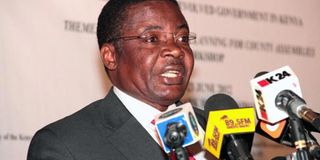Breaking News: At least 10 feared to have drowned in Makueni river
Why Central African Republic factions failed to sign ceasefire deal

Kenneth Marende at a past event. FILE PHOTO | SALATON NJAU |
What you need to know:
- Planned ceremony was affected by State of the Nation speech.
- The mediators have had to counter criticism that it does not have blessings of the UN.
Warring parties in the Central African Republic failed to sign a peace deal in Nairobi last week due to congestion in the diaries of the organisers.
Kenneth Marende, the Chief Mediator of the Nairobi Central African Republic Peace Initiative told the Sunday Nation on Saturday that the planned ceremony on Thursday was affected by the State of the Nation address by President Uhuru Kenyatta.
“We were initially given a date of the 26th of March. But this was also a day for the State of the Nation speech, a fact which we had overlooked,” he said.
“Organising this ceremony is also a matter of cooperation between the mediators, the presidency and the parent ministry of Foreign Affairs.”
In December last year, President Kenyatta appointed Mr Marende to mediate between the Christian anti-Balaka rebels and the former Seleka rebels mainly Muslims.
Representatives of the two groups have been in Nairobi since December when Marende’s team that also includes Lt-Gen (Rtd) Njuki Mwaniki was formed upon request from Congolese President Denis Sassou-Nguesso who is the UN-appointed international mediator.
On February 5, the team announced the two sides had agreed on a ceasefire and that they would sign an agreement the following week. It was never to be.
CRITICISM
Even then, the mediators have had to counter criticism that it does not have blessings of the UN and that they have not included all parties to the conflict such as the interim government in Bangui, religious groups, civil society and political parties in the mediation.
Mr Marende, a former Speaker of the Kenyan Parliament, denied these claims saying they have the support of everyone.
“That (accusation) is an old tune which has been played before. But there is no issue with the Nairobi initiative. We have the support of everyone,” he said.
“The parties had agreed on a ceasefire and the document was initialled. What was remaining was to make the agreement formal by having the parties sign it. That should happen soon,” he said.
Violence erupted in CAR in March 2013 when the Seleka group toppled the ruling regime of Francois Bozize and replaced him with Mitchel Djotodia.
In January 2014, he quit office amid violence from the Balaka group.
The warring factions violated a ceasefire deal they had signed last year in Congo.





